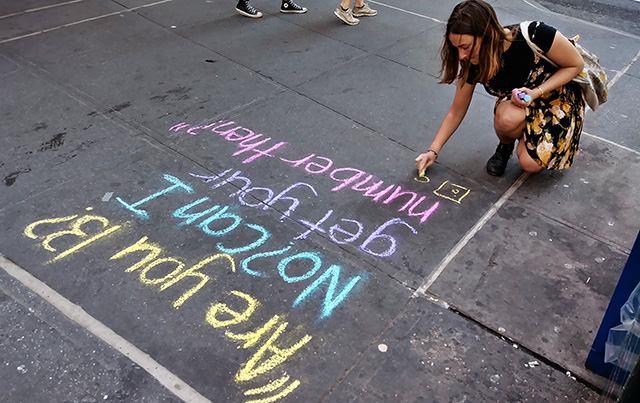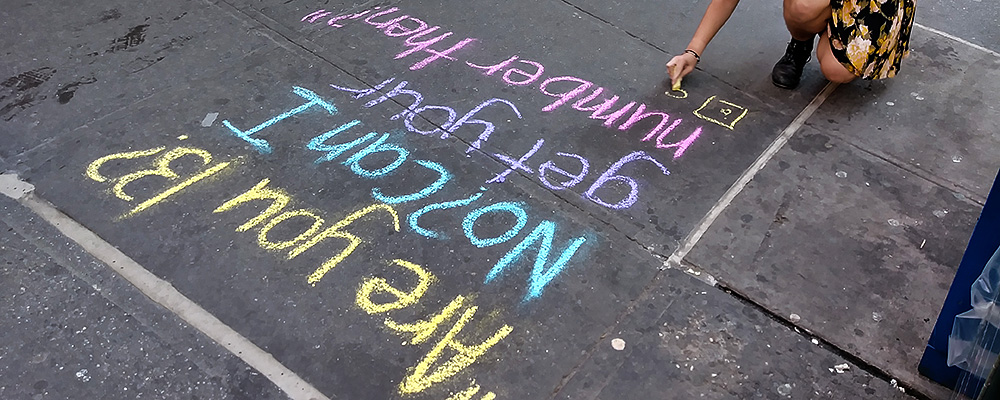By Tiffany Vargas
Sophie Sandberg crouched down at the corner of 41st Street and Broadway to write the offensive words that were sent to her by a young girl in chalk. Some people stopped to gawk and read what she was chalking, and some took pictures of the colorful message on the sidewalk. Sandberg, 22, stood back when she was done. The message read, “Are you 13? No? Can I get your number then?” with the hashtag #StopStreetHarassment underneath.
The submission was one of the many collected by Sandberg for Catcalls of NYC, an initiative to raise awareness about street harassment. Members uses sidewalk chalk to write the catcalls on the New York City streets. Sandberg started it as a project for a writing class at NYU to share her and her friends’ experiences with catcalling. It has evolved into a platform with over 100,000 followers on Instagram and dozens of submissions a day from women of all ages.
Eight-five percent of women under the age of 17 experienced street harassment in the United States, according to research done by the School of Industrial and Labor Relations at Cornell University and Hollaback!, a non-profit organization to end the harassment. Sixty-seven percent experienced it before the age of 14. A very small percentage — 3 percent of those under the age of 40 — said they found street harassment to be flattering.
From propositions to perform sexual acts to asking to be someone’s Harvey Weinstein, the submissions that are sent to the Instagram, sometimes from girls as young as 8 years old, have shocked members of the Catcalls of NYC team. Cameron Andersen, 21, a junior at NYU studying Cultural Anthropology and Gender and Sexuality, has been chalking for the team since February 2019. She is always disheartened to see submissions from young girls but isn’t completely surprised since she’s experienced catcalling from a young age herself. “There will be some submissions where the girl will give her age as context in her story, but then are some where the catcaller makes a point of liking how young she is,” she said. “Those are the ones that shock me the most.”

Jessica Kurtz, 20, a student majoring in humanitarian studies and philosophy at Fordham University, has been chalking with the team for five months. She believes that it can be easier to sympathize more with submissions from younger women, rather than older, because people find it more justifiable to harass older women. “I think that this partially stems from the fact that it’s easier for people to understand that it is inappropriate to sexually harass or street harass children whereas they find it more difficult to condemn the same behavior when it is inflicted upon older women,” she said.
Women who get harassed on the street often feel anger, fear and lowered self-esteem. The ILR School and Hollaback! found that more than half of those who took part in the survey had changed their clothing, refused a social event, chosen a different transportation option or felt distracted at school or work due to harassment.
Girls who get catcalled for the first time may feel confused because they’re often told by others that what was said was meant to be a compliment and that they should feel flattered. Chloe Dixon, a student at the School of Visual Arts, was 14 years old when she was catcalled on a trip to California. She was hiking in Yosemite when she stopped to pick up her fallen water bottle. “I heard this voice yell out, ‘Keep bending over sweetie! You’re gonna be doing that a lot real soon!,'” she said. “I turned around and I saw this group of teenage boys try to run away. I felt really embarrassed and I wanted to hide.”
Her friends at the time told her that the boys probably liked her and even her mother joked about how it used to happen to her as a kid. However, as the words sat with Dixon, she realized that what the boys said made her uncomfortable. “Looking back now it makes me sick to think that people have been conditioned to accept such disgusting treatment like that and not do anything about it,” she said. “I haven’t been catcalled since then and it makes me feel grateful and yet makes me feel unwanted.”
Dixon, now 20, has grappled with those feelings for years. She says it has even affected her romantic relationships. She says she struggled with maintaining romantic relationships because she felt that the only thing that people want from her “is sex or to be in control.”
In a poll done by YouGov, most people found that catcalling is not appropriate but at least 18 percent found that it’s sometimes appropriate and 2 percent found that it’s always appropriate. Dixon believes that catcalling is degrading, and it shouldn’t be right to make someone feel unsafe by doing it. “It angers me when people say, ‘It’s a compliment, you’re overreacting,’ or ‘You deserved it based on…'” she said. “It’s such a toxic way of thinking and it honestly takes all the progress we’ve made and thrown it away.”
Stopping street harassment is easier said than done because of how frequent it is. While some may only get catcalled once or a handful of times in their lives, others get harassed constantly. For the past couple of years, Kurtz had been dealing with street harassment regularly and it was difficult for her to handle emotionally. “I would go through phases where I felt immune to street harassment, that it didn’t have a lasting effect on my psyche,” she said. “Then, I would go through phases where I would be so fearful of street harassment and the possibility that it would lead to sexual violence that I refrained from leaving my apartment whenever I could.”
Wanting others to feel how those who are catcalled feel is among the reasons why Sandberg wanted to write the comments on the streets. “If someone who doesn’t normally get catcalled or harassed reads this comment, they feel this feeling of confusion or upset and it’s a similar feeling to the feeling of being catcalled because people who read it are so shocked by the comment,” Sandberg said. “I think that those original feelings help people to be empathetic to the issues of catcalling.”
Their work is not always well received, however. The team sometimes gets scolded for writing vulgar things on the street. Other times they get called names and even have men hit on them. People in the comments of the Instagram often say that the submissions should be considered compliments and they can say whatever they want because of freedom of speech. “I also get a lot of men misunderstanding the project, asking if they can take pictures of me or berating me for being a part of the problem,” Andersen said.
Despite the negative feedback and criticism, Sandberg and her team’s work have also inspired dozens around the world to create their own initiative in their state or city, such as Catcalls of London. Sandberg hopes to create a program so they can go to schools to teach middle and high school students about catcalling before it happens. “I’d like to tell people not to let it get to you, but I think that’s impossible,” she said. “Of course, it’s going to get to you so don’t be silent about it. Share with your friends. Find a support system to talk to because just telling your story can be a form of raising awareness and making change.”



